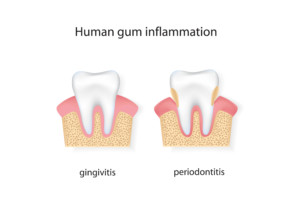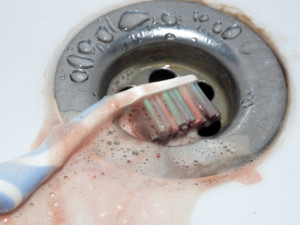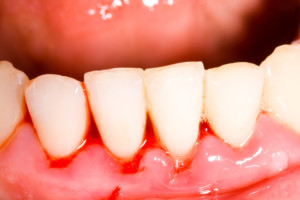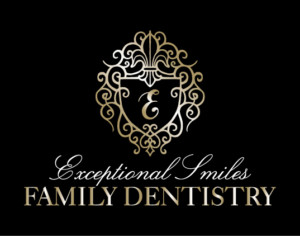
Gum disease, or periodontitis, is one of the most prevalent ailments in America. Nearly half of adults over 30 have some form of periodontitis, and that number goes up to over 70 percent at age 65 and older. Gum disease can cause many issues with your oral health, but that’s not where the damage stops—it also increases your risk for many other conditions, such as diabetes, stroke, and heart attack.
What Causes Gum Disease?
The majority of gum disease is caused by improper oral hygiene. When teeth are not cleaned properly, plaque builds up and eventually hardens and turns to tartar, which can spread below the gum line. Smoking can also increase your risk for gum disease, and some researchers believe that periodontitis could be associated with high levels of stress.
The good news is that gum disease is treatable. Catching it early is the most important factor to successful treatment, and knowing the symptoms can help you start treatment as early as possible and keep the damage to a minimum.
Warning Signs for Gum Disease
You could be at risk for or have already developed gum disease if you experience one or more of the following symptoms:
- Bleeding After Cleaning

bloody toothbrush lies in a washbasin.
Bleeding gums can be a sign of more than just brushing too hard—it can also mean you’re in the early stages of gum disease, even if you have no other symptoms.
- Sensitive Teeth
When gums start to wear away, the root of your teeth is exposed, which can cause the teeth to become sensitive to hot and cold temperatures.
- Chronic Bad Breath
Gum disease is caused by bacteria that live below the gumline. These bacteria produce a sulfur compound that has a very unpleasant smell, and can be responsible for chronic bad breath or halitosis.
- Red or Swollen Gums

Healthy gums should be pink, but not red. Red and swollen or inflamed gums are often a sign of gum disease.
- Loose Teeth
In more advanced stages of gum disease, the gums separate from the teeth and eventually, bone loss can occur. When this happens, there are no anchors holding the teeth in place and they can become loose.
Preventing Gum Disease

healthcare – dentist with toothbrush in hospital
The number one way to prevent gum disease is to keep up with your oral hygiene regimen. Make sure you brush and floss daily, change your toothbrush every three months, and drink plenty of water.
And, of course, your oral hygiene routine should always include regular dental checkups. If you think you may be at risk for gum disease, or if you’re just due for a good cleaning, call our office at (540) 434-5500 to schedule an appointment today.



